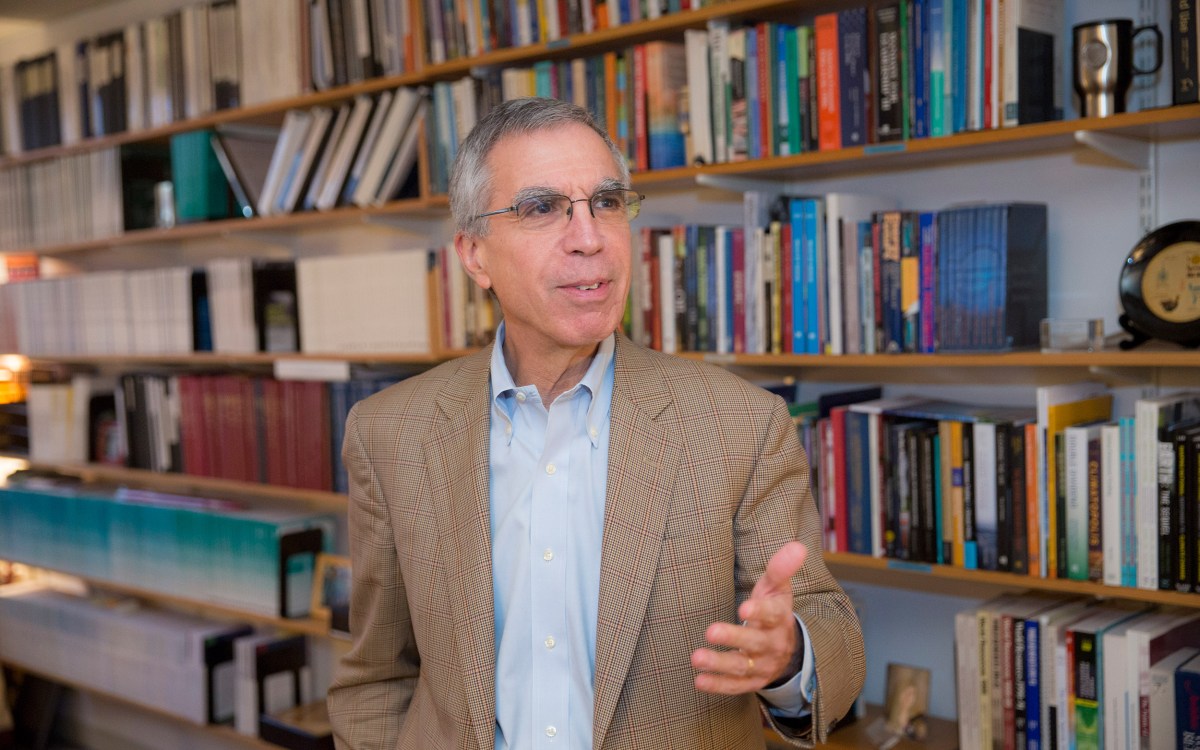
Kimberly Humphrey (clockwise from upper left), Tess Wiskel, Aaron Bernstein, and Caleb Dresser discuss the key takeaways for climate and health from COP27.
Kris Snibbe/Harvard Staff Photographer
Raising health care’s climate voice
Physicians discuss COP27, need to keep focus on toll suffered by real people, particularly those in most vulnerable countries
Climate change’s toll on human health is becoming more widely appreciated as impacts mount, including recent disasters such as floods in Pakistan and severe drought in the Horn of Africa, according to Harvard physicians who attended recent climate talks in Egypt. They noted an increased presence of health care experts at this year’s event, calls for more studies to prompt policy changes, and a move by health systems to clean up their own emissions.
“We know we can’t have healthy people without a healthy planet,” said Kimberly Humphrey, an emergency room physician and FXB Climate Change and Human Health Fellow at the Harvard Francois-Xavier Bagnoud Center for Health and Human Rights. “The thing that I’m probably most excited about over the next 12 months is cross-sectoral collaborations — how health is being integrated across all different areas — and the solutions that we will be able to come up with working with others in this space who don’t come from the health sector. It’s just incredibly promising.”
Humphrey spoke at a virtual discussion sponsored by the FXB Center and the Center for Climate, Health and the Global Environment (C-CHANGE) at the Harvard T.H Chan School of Public Health. The event, which occurred last week, also featured two other FXB climate change and health fellows, both emergency-room physicians from Beth Israel Deaconess Medical Center: Caleb Dresser, an instructor in emergency medicine at Harvard Medical School, and Tess Wiskel, an HMS clinical fellow in emergency medicine. The event was moderated by C-CHANGE Interim Director Aaron Bernstein.
Panelists shared their experiences at COP27, the 27th Conference of the Parties to the United Nations’ Framework Convention on Climate Change, which occurred earlier this month. Attendees hailed progress made toward creating a fund financed by the world’s industrialized nations to help the most vulnerable countries deal with climate change’s impacts. But the event has also drawn criticism for a lack of progress toward more ambitious national pledges to reduce greenhouse gas emissions.
The physicians said they were pleasantly surprised at the widespread acknowledgement that health is an important consideration when talking about climate change but said it was not absolute and hasn’t translated to a more prominent role for health experts. Research can help, Wiskel said, by generating specific data on impacts that can provide the foundation for policy changes that are needed.
Just walking around the COP site, in the desert community of Sharm El Sheikh, Egypt, highlighted some of the challenges of climate change, including extreme heat — a major issue in the years to come — and the disparities between rich and poor, as seen in the differences between the air-conditioned tented pavilions of different countries. Wiskel cited the contrast between the basic pavilion of developing Niger next and the well-appointed site for oil-rich United Arab Emirates, host of next year’s COP.
Also visible was a large and energetic youth contingent, which continues to push for greater action to address climate change, panelists said. At the opposite end of the spectrum, Humphrey pointed out, were the 660 lobbyists who reportedly attended representing fossil fuel interests, which were otherwise largely invisible.
A key development during the event, Bernstein said, was the announcement by the U.S. Department of Health and Human Services that more than U.S. 100 health care organizations have pledged to reduce emissions in the coming years. The organizations signed the White House/HHS Health Sector Climate Pledge to cut emissions 50 percent by 2030 and reach net zero by 2050. HHS also announced an agreement with the National Health Service England to collaborate on procurement and supply chain reforms.
While voluntary, panelists said the steps can reduce the considerable contribution that health care makes to planet warming emissions. Health care and its supply chain account for 8.5 percent of all greenhouse gas emissions in the U.S., for example, Bernstein said. Globally, Humphrey said, if the health care industry was a nation, its emissions would make it the fifth-largest country.
“We’ve all heard the term ‘supply chains’ more in the last couple of years than in the whole previous part of our lives, unless you’re in economics,” Dresser said. “And that’s a really important thing to be learning about, because as a health care system, this is a huge piece of our carbon emissions, and I think the solutions to this have to be large-scale.”
In addition to these steps, Dresser said, it’s critical for those in health care to not just continue to offer the opinions of experts but to maintain focus on those being impacted by warming and keep bringing their personal stories to light at high-level gatherings like COP27, to personalize what’s at stake.
“I think we also need to be making an effort to elevate the voices of people, communities, nations that have been impacted by climate change,” Dresser said. “Those individual stories are the single most powerful message we have about why it matters that we take steps to address ongoing carbon emissions and set up such structures and policies that will keep people safe.”









